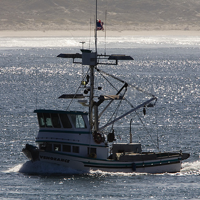In his keynote address to the 1883 International Fisheries Exhibition in London, T.H. Huxley, a prominent biologist of the day, maintained that the ocean's supply of fish, such as cod, was inexhaustible: Fish were present in the oceans in such large numbers and reproduced prolifically, while only an insignificant fraction of them in proportion to their numbers was captured. Huxley concluded that human fishing efforts could not meaningfully affect the number of fish in the oceans and that it was unnecessary and even wasteful to attempt to regulate their capture.
More than two centuries earlier, Hugo Grotius, the famous Dutch international lawyer and champion of the legal concept of freedom of the seas, had expressed a similar view on the availability of fisheries, writing that, "Everyone admits that if a great many persons hunt on the land or fish in a river, the forest is easily exhausted of wild animals and the river of fish, but such a contingency is impossible in the case of the sea."
Though increasingly questioned, such faith in the unlimited nature of ocean fisheries persisted into the 20th century, until it finally became undeniable that the inexhaustibility of ocean fisheries was but a myth.

